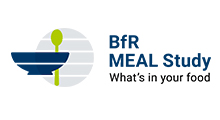You are here:
Hauptmenü
- The Institute
- Mission statement
- Facts & Figures
- Remit
- BfR structure
- Working at the BfR
- Scientific Advisory Board
- Principles of Scientific Practice
- Databases
- GLP Federal Bureau
- Quality management
- Environmental Management
- The BfR-Committees
- Co-operation
- National Breastfeeding Committee
- Reference Laboratories
- EFSA Focal Point
- German Centre for the Protection of Laboratory Animals (Bf3R)
- Food safety
- Product Safety
- Chemical Safety













